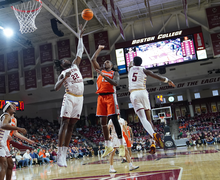Blum: Amid NCAA tournament run, perspective on what’s most important was lost
Evan Jenkins | Staff Photographer
Brianna Butler walks off the court after Syracuse beat Washington in the Final Four to advance to the national championship game.
You really could twist the narrative of Syracuse women’s basketball’s run into whatever you want.
Theoretically, this run could be about the amount of coverage the women’s team received, especially as it compares to a men’s team that often dominates the headlines.
It could be about that if you wanted it to be.
This run could be about the women’s team becoming a top program after many years of playing second-fiddle to a men’s team with a history of success.
That’s the narrative you could focus on.
It could be about Syracuse University not doing enough to create an atmosphere for equality in athletics. It could be about women’s rights. It could be about the Syracuse men’s team. It could be about the team’s poor attendance.
We all love a good storyline, even if it’s one that we make to overshadow what the real storyline should be. This historic NCAA tournament run for the women has been connected to every end of the spectrum. But in reality, what it’s really about is a team that dominated the postseason all the way to national title game. Because the politics attached to this run are just politics — hype and hyperbole, un- or under-researched ideas. Distortions of the truth. There are a lot of contexts that you could view the NCAA women’s tournament run, but I choose to stick to just how impressive it truly was.
A dream scenario for Orange basketball fans ended on Tuesday night. Two teams from one city both playing in the Final Four — only the ninth time in college basketball history that it’s happened. The men’s team lost on Saturday night in Houston to North Carolina in the Final Four. The women’s team lost in the national title to powerhouse Connecticut.
It was an unprecedented amount of success. Both the women’s team and men’s team shared gamedays for the Sweet 16 and Elite Eight. Both attended the same pep rally to send them off. Because both teams won, their success was, in a very tangible yet unfair way, connected.
It gave us an opportunity to criticize the media for prioritizing men’s coverage over the women. An unfair criticism, of course, partly because the women’s team both receives local coverage (I covered the team for two years and saw a good amount of others doing the same). But also because the men’s team has a stronger base of success. It has more people interested in attending its games. Media, like any business, is a supply and demand game. If there’s less readership, then there’s less coverage.
This then gave us an opportunity to make a point of showing the disparity of attendance between the two teams. Another misleading criticism. Yes, the attendance was atrocious, but without an established history of success, it’s hard to expect good crowds. At almost every school around the country, you’ll find higher attendance at men’s games. I’m not going to get into why, but it’s an issue that isn’t limited to the Salt City.
I covered the men’s team this season. And the story of their Final Four run was about how unexpected and special it was. How two seniors in Trevor Cooney and Michael Gbinije got to define their legacy over a historic two-week stretch. How Jim Boeheim defied the odds of suspension and criticism to confirm his place among the coaching greats.
But the story surrounding the women’s tournament just didn’t seem to be about what was on the court. It was about comparisons and shortcomings. The run was put into peripheral contexts, unrelated to the fact that the team was one of the best in the country. That it lost one game since Jan. 26.
Syracuse went on a 16-0 run against the Huskies to give life to a game that had lost it. In that moment, it was just about the basketball. Syracuse’s ability to press and turn defense into easy offense. Its star power in Brianna Butler, Alexis Peterson and Brittney Sykes was what was on display. That was the narrative. Not SU attendance, coverage or its inability to recruit Syracuse native and UConn star Breanna Stewart.
But then the Huskies went back on their blistering, record-setting pace. The Huskies captured its fourth-straight NCAA championship. Syracuse was deprived of its first. A magical run was over.
It’s a run that should be appreciated for how spectacular and improbable it was. In all likelihood, that’s what it will be remembered for.
But in the moment, the fleeting narratives threatened to steal the spotlight from a team that deserved better.
Published on April 6, 2016 at 10:18 pm






